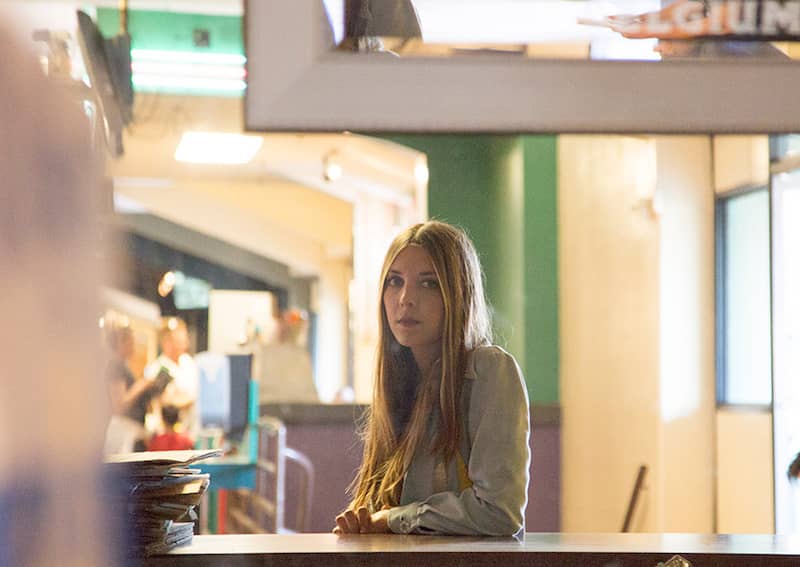Drawing similarities to labelmate The Weather Station, ITASCA is the music of L.A.-based guitarist, singer, and songwriter Kayla Cohen – who will be touring Europe with RYLEY WALKER in November. Dreamy and alluring, her music draws inspiration from the music of the Laurel-Canyon mystics and East Coast noisenicks, with acid-folk tinged, hazy, heat-mirage spacey pastorals. Listen in full to her new album Open To Chance coming out on Paradise of Bachelors on 30 September.
“As I was walking/I came upon/chance walking/the same road upon.” — Robert Creeley, “Kore” (1959)
In his 1959 poem “Kore,” Robert Creeley conjures a roadside encounter with chance, personified as a woman with dark eyes and earth in her hair, “accompanied/by goat men” and stepping in time to a “double flute.” The poem’s title historicizes the incident, cloaking it in an obscure classical ambiguity: Kore, or “maiden,” can refer either to Persephone, the mythological Greek goddess of the underworld, or generically, to ancient Greek sculptures of young women, mortal or divine, characterized by a stylized, enigmatic grin known as the “archaic smile.” This uncertainty shades the poem’s spare beauty with a stippling of sun-dappled dread; does the appearance of the lady chance, with her Mona Lisa smile and her satyrs, prefigure an occasion for love or death?
It’s fitting that Los Angeles-based guitarist, singer, and songwriter Kayla Cohen, who records and performs as Itasca, cites Creeley, and “Kore” in particular, as an influence on her enchanting, quietly assured new album Open to Chance. A hue of emergent classicism colors the stately pace and graceful carriage of these eleven understated, helical songs, suggesting both the dirt tangled in Persephone’s hair as well as the esoteric wordplay and sly musical tactics of a trickster. With Cohen’s gorgeous, moonlit voice,Open to Chance sings out an archaic smile; it poses that same inscrutable riddle of the maiden.
The idea of chance made manifest in the guise of a traveler appeals to Cohen’s symbolist songwriterly tendencies, which embrace both the arcane (her recurring, veiled references to tarot and the occult) and the quotidian (the album jacket photos were shot at theSanta Anita racetrack in Pasadena, a crucible of bad luck for gamblers). Like Creeley’s poem, Itasca’s ostensibly concrete, rustic songs—populated by chickens, mice, roses, rain, and pigpens—often pivot on a detail that reveals the limpid observational imagery in fact to be in thrall to other, sometimes unsettling forces, natural or supernatural. However, far from sounding ponderous, these juxtapositions of the everyday and the extraordinary are always subtle, even droll—winking incursions of faint magic into otherwise grounded, guitar-driven songs about a young woman’s various relationships. They also happen to reside within airy, inviting ballads—country songs in the loose, sun-shot Southern Californian sense (lots of pedal steel and space)—with melodies like arid blooms effortlessly issued from a dusty abode of adobe and tile.
“Angel” features both a “dancing Pan” and a “seedsman” with vines in his hair, a figure from the same street as Creeley’s kore. The icy solo piano number “Carousel” includes a chilling couplet that guts the modern, bourgeois notion of the five-day work week, and all that entails, with a pagan sacrificial scene: “And the weekends are filled with the act/Of dressing and toasting the death of the calf.” These are, perhaps, “the pleasures of the unknown” of which Cohen sings, but they are disconcertingly normalized in porch-friendly country-rock form, available at an altar near you come quittin’ time on Friday. The critic Harold Bloom praised JohnCrowley’s postmodern faerie novel Little, Big (1981) for the way it “renders domestic the marvelous”; something similar, it seems, is afoot throughout Open to Chance.
Just as the word Itasca itself is equivocal—a 19th-century pseudo-Ojibwe place name and portmanteau of the Latin words for “truth” (veritas) and “head” (caput)—so too is Cohen’s musical project mutable and multivalent: fundamentally unconcerned with genre, but richly allusive of the hermetic worlds of private-press Californian canyon-cult mystics and East Coast noiseniks alike. Tellingly, her songwriting idiom emerged gradually from her longstanding noise and drone practice. Her evocative, out-of-time recordings as Itasca—refined over the course of several releases, including the acclaimed 2014 LP Unmoored by the Wind—reflect her Janus-faced gaze towards both baroque, acid folk-inflected songcraft and deconstructive, textural sonics.
Though deeply informed by the mythology and iconography of the modern American desert West, Cohen likewise finds kinship with a lineage of English iconoclasts such as Michael Chapman and Bridget St John. Her adept, fingerstyle guitar work—nimble but unshowy, always at the service of framing her plaintively unspooling modal progressions and sonorous vocals—centers Itasca’s melancholy pastorales in a hazy, heat-mirage space equally suggestive of familiarity and distance, community and anomie. Open to Chance is her first album to feature the full band with whom she currently records and tours, including pedal steel player and frequent collaborator Dave McPeters, drummer Coleman Guyon (and occasionally Kacey Johansing), and bassist and vocalist Julia Nowak. The result is Cohen’s most accomplished, beguiling, and finely rendered record to date, the most complete invocation of the Itasca ethos.
The poem “Kore” ends with an aptly anxious question: “O love/where are you/leading/me now?” Maybe the mysterious woman on the road brings the promise of both love and death. As Cohen asks of chance in “No Consequence,” “Who is this blind god who walks with no regrets?”
UK Tour Dates:
13. November – Brighton, UK / The Haunt
14. November – Manchester, UK / Ruby Lounge
15. November – Glasgow, UK / Broadcast
16. November – Birmingham, UK / Hare & Hounds
17. November – London, UK / Islington Assembly Hall
Open To Chance is released on Paradise of Bachelors on 30 September.
Photo Credit: Ella Andersson

